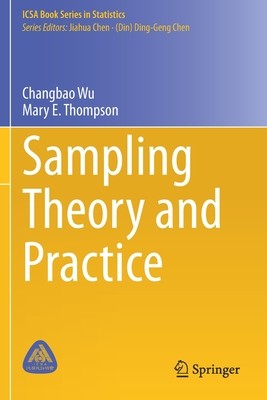
- Išsiųsime per 10–14 d.d.
- Autorius: Changbao Wu
- Leidėjas: Springer
- ISBN-10: 3030443922
- ISBN-13: 9783030443924
- Formatas: 15.6 x 23.4 x 2 cm, minkšti viršeliai
- Kalba: Anglų
- Extra -15 % nuolaida šiai knygai su kodu: ENG15
Atsiliepimai
Aprašymas
The three parts of this book on survey methodology combine an introduction to basic sampling theory, engaging presentation of topics that reflect current research trends, and informed discussion of the problems commonly encountered in survey practice. These related aspects of survey methodology rarely appear together under a single connected roof, making this book a unique combination of materials for teaching, research and practice in survey sampling. Basic knowledge of probability theory and statistical inference is assumed, but no prior exposure to survey sampling is required. The first part focuses on the design-based approach to finite population sampling. It contains a rigorous coverage of basic sampling designs, related estimation theory, model-based prediction approach, and model-assisted estimation methods. The second part stems from original research conducted by the authors as well as important methodological advances in the field during the past three decades. Topics include calibration weighting methods, regression analysis and survey weighted estimating equation (EE) theory, longitudinal surveys and generalized estimating equations (GEE) analysis, variance estimation and resampling techniques, empirical likelihood methods for complex surveys, handling missing data and non-response, and Bayesian inference for survey data. The third part provides guidance and tools on practical aspects of large-scale surveys, such as training and quality control, frame construction, choices of survey designs, strategies for reducing non-response, and weight calculation. These procedures are illustrated through real-world surveys. Several specialized topics are also discussed in detail, including household surveys, telephone and web surveys, natural resource inventory surveys, adaptive and network surveys, dual-frame and multiple frame surveys, and analysis of non-probability survey samples. This book is a self-contained introduction to survey sampling that provides a strong theoretical base with coverage of current research trends and pragmatic guidance and tools for conducting surveys.
EXTRA 15 % nuolaida su kodu: ENG15
Akcija baigiasi už 2d.01:04:58
Nuolaidos kodas galioja perkant nuo 10 €. Nuolaidos nesumuojamos.

- Autorius: Changbao Wu
- Leidėjas: Springer
- ISBN-10: 3030443922
- ISBN-13: 9783030443924
- Formatas: 15.6 x 23.4 x 2 cm, minkšti viršeliai
- Kalba: Anglų
The three parts of this book on survey methodology combine an introduction to basic sampling theory, engaging presentation of topics that reflect current research trends, and informed discussion of the problems commonly encountered in survey practice. These related aspects of survey methodology rarely appear together under a single connected roof, making this book a unique combination of materials for teaching, research and practice in survey sampling. Basic knowledge of probability theory and statistical inference is assumed, but no prior exposure to survey sampling is required. The first part focuses on the design-based approach to finite population sampling. It contains a rigorous coverage of basic sampling designs, related estimation theory, model-based prediction approach, and model-assisted estimation methods. The second part stems from original research conducted by the authors as well as important methodological advances in the field during the past three decades. Topics include calibration weighting methods, regression analysis and survey weighted estimating equation (EE) theory, longitudinal surveys and generalized estimating equations (GEE) analysis, variance estimation and resampling techniques, empirical likelihood methods for complex surveys, handling missing data and non-response, and Bayesian inference for survey data. The third part provides guidance and tools on practical aspects of large-scale surveys, such as training and quality control, frame construction, choices of survey designs, strategies for reducing non-response, and weight calculation. These procedures are illustrated through real-world surveys. Several specialized topics are also discussed in detail, including household surveys, telephone and web surveys, natural resource inventory surveys, adaptive and network surveys, dual-frame and multiple frame surveys, and analysis of non-probability survey samples. This book is a self-contained introduction to survey sampling that provides a strong theoretical base with coverage of current research trends and pragmatic guidance and tools for conducting surveys.




Atsiliepimai